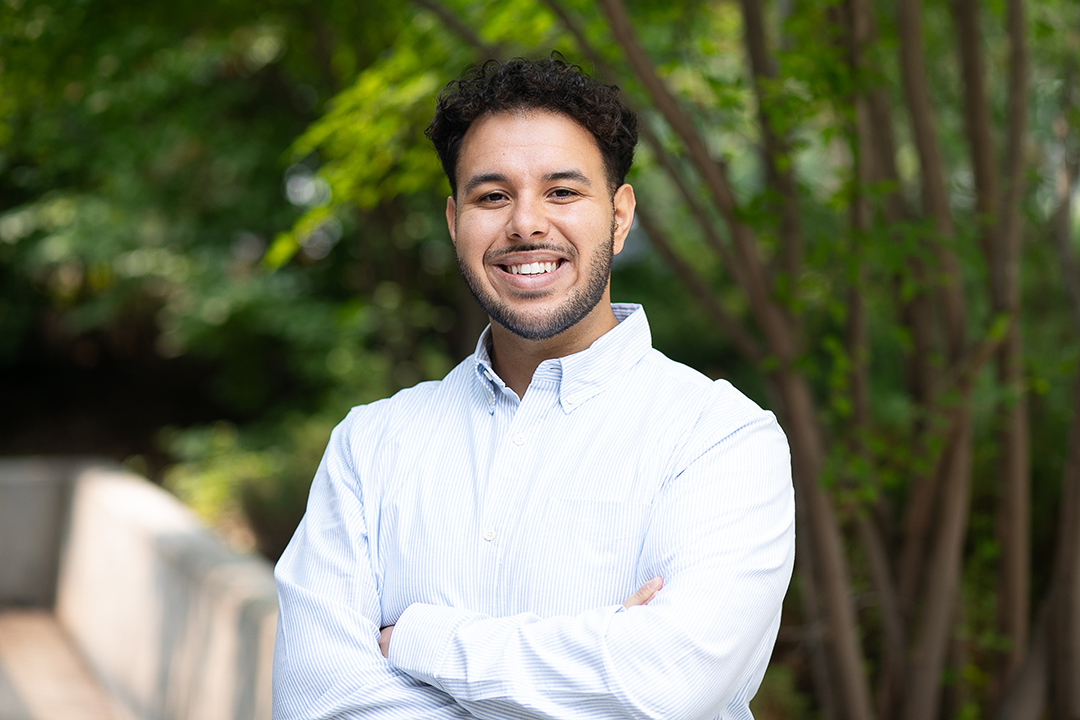
Five questions with Dr. Arthur Nery Finatto, WCVM graduate
Dr. Arthur Nery Finatto of Caxias do Sul, Brazil, will receive his PhD degree during the University of Saskatchewan (USask) Fall Convocation on Nov. 12 at Merlis Belsher Place.
By WCVM TodayFinatto’s research focused on the discovery and characterization of porcine beta-defensin 5 (pBD-5). This host defence peptide (HDP) naturally occurs in the pig’s innate immune system and may help to combat swine dysentery, a highly infectious and production-limiting disease.
He chose to study at the WCVM “because it offers cutting-edge, internationally respected training. The professors are leading scientists in their fields, and I knew that being a WCVM graduate would provide many opportunities for me.”
Q. What’s been a highlight of your time at the WCVM?
I always loved presenting my research at the college’s Large Animal Clinical Sciences Seminar. Although it was just a 15-minute talk that was mainly to the people I saw every day in the hallways, I really enjoyed showing my motivation to move forward in my research. I especially loved when they asked questions or showed interest.
Q. How have people at the WCVM helped you during your program?
My supervisor, Dr. Matheus Costa, taught me to be independent and confident; his research team (the Costa Lab) has shaped me into a better person and scientist. My peers — and even the pigs from our long clinical trials — have taught me the value of collaboration. Noreen Rapin and Champika Fernando, our lab managers, showed me the importance of organization and working at a steady pace. The Large Animal Clinical Sciences (LACS) faculty reminded me of the power of skepticism, kindness and reliability.
Q. What are your plans now that you’ve completed your graduate program?
I hope to continue pushing forward the human knowledge through research and to become a university faculty member. I want to contribute to making the world a better place by contributing to science and making scientific information available to everyone. By seeing animals through a different lens — exploring their genes and immune systems with the goal of better understanding and protecting them — I believe that I can make a big impact on human knowledge.
Q. How does your new degree help you reach the next step in your career path?
I’m working as a USask sessional lecturer in the Department of Animal and Poultry Science at the College of Agriculture and Bioresources while also serving as a postdoctoral fellow in the Faculty of Veterinary Medicine at the University of Calgary. I’m fortunate to be working with two of the most prestigious institutions in Western Canada, and I likely wouldn’t have been offered these positions without the credentials and experience I gained at the WCVM. My time at the WCVM has truly been significant and transformative period in my life.
Q. What’s your advice for students starting their USask graduate studies based at the WCVM?
Give it your best every day and believe that people want you to succeed — never the opposite. On the days you doubt yourself (and those days will come), remember how much you wanted to be where you are right now, and that questioning yourself is part of growing as a person. And don’t forget that your eight-year-old self would be so proud of the adult you and what you’ve accomplished.
Together we will support and inspire students to succeed. We invite you to join by supporting current and future students' needs at USask.
